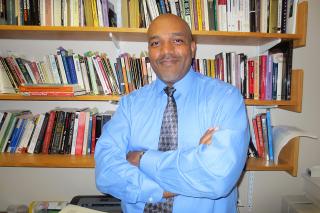Professor and Department Chair Sheldon George has diverse research and teaching interests in literary and cultural theory, race, and psychoanalysis. He spoke with us about his new scholarship that explores Black women authors from around the world, as well as his fascination with psychoanalytic theory and historic Boston writers.
Tell us about your forthcoming book, Experimental Subjectivities in Global Black Women's Writing: Race and Narrative Innovation (Bloomsbury Publishing, 2023)
My project is a co-edited collection of essays focused on contemporary global Black women writers from the U.S., the Caribbean, the U.K. and Africa. The collection explores the inventive narrative techniques used by Black women writers to depict Black subjectivity, or Black subjecthood.
African American author Toni Morrison has explained that in writing her novel Beloved — which tells the story of a mother choosing to kill her child to prevent the child's return to slavery — she had no prior literary models for representing the subjective lives of enslaved individuals confronted by such impossible choices. Morrison had to invent narrative techniques that would humanize a mother who commits a barbarous act that, to some, may confirm slavery's assertion of the bestial nature of the enslaved.
The collection explores how Black women writers reshape the formal structures of their novels and pioneer different styles of narration to represent the lives, histories, and subjective realities of racialized individuals. The contention I and my co-editor (Jean Wyatt) make is that, through their stylistic innovations, the literary texts of contemporary global Black women writers urge readers to reconceptualize racialized subjectivities.
Why are you drawn to women's writings?
I think that diasporic Black women's writings present rich sites of literary innovation. Cultural and historical influences have contributed to the large number of Black women writers' texts that experiment with subjectivity. Because of the history of European colonization in the Caribbean and Africa, being a writer of fiction in these present-day locations involves recognition of and daily encounters with different cultures.
Histories of slavery and migration in Britain and the United States have produced a similar distancing of Black subjects from the ideologies and sentiments that define prevailing attitudes of these nations. Black women's frequent exclusion from dominant power structures have encouraged adaptability in their subject positions. The goal of the edited volume is to explore how cultural diversity and social positioning encourage writers to think and to write with a fluidity and variety less common to persons comfortably ensconced in a single, familiar cultural context.
You recently delivered a keynote lecture at Duquesne University, "Racism and the Courtly Lady: From the Crusades to the Gentility of Lynchers." What connection do you make between the Middle Ages and modernity?
My talk drew on the work of the French psychoanalyst Jacques Lacan. Lacan makes the argument that the figure of the Lady in courtly love helped define societal manners for centuries, starting in the Middle Ages. I argued that Lacan ignores that the courtly lover, the knight who pursues the Lady through endless tasks and insurmountable challenges aimed at proving his love, was often a soldier of the Crusades. He was involved in a Holy War that pitted Christians against the darker peoples of the Middle East.
The talk traced the historical emergence of race as a category of difference developed in the Crusades, while also tying the Lady to the culture of manners and gentility that emerged in the antebellum American south. I read the Lady as the key figure facilitating atrocities of racism that extend to lynchings. What I was interested in was the ways that mannerly respect and protection of Ladies transformed into socially accepted forms of violence.
In your view, how can psychoanalysis inform race studies?
I would say that psychoanalysis has not sufficiently informed race studies. Some recent scholars have argued that Black subjectivity was never imagined by Freud and his followers, and that therefore psychoanalysis cannot account for Black subjectivity. I disagree. The "black" psyche is not inherently different from the psyche imagined by psychoanalysis, but historical experiences and social positioning frame the psychic experiences of Black subjects in important ways.
I find Lacanian theory to be a nuanced, rich articulation of the operations of the psyche. My goal is both to enrich race studies with the sophisticated conceptions of subjectivity made available through Lacanian theory, and to expand the realm of Lacanian conceptualizations of the subject to more fully account for the operations of race.
You teach a course on nineteenth-century Boston writers. What do you want students to take away from this course?
My Boston writing course touches on figures from the nineteenth century who are linked to the greater Boston area, like William Wells Brown, Sarah Orne Jewett, Ralph Waldo Emerson, Harriet E. Wilson, Edgar Allan Poe, and Louisa May Alcott. The course highlights writings by women, ex-slaves and queer-identified writers to explore issues of authority, voice, and persuasion in writing.
Students investigate how each author's rhetorical choices allow them to frame new, strategic representations of their identity. The goal is to make students aware of how self-presentation in writing is informed by an awareness of location and audience. My final aim is to help students develop a necessary adaptability in their own writing, a versatile writing style that is aware of the demands of its audience and conscious of its rhetorical self-presentation. I think this kind of versatility is essential for students' success as they move across the liberal arts and through their desired majors.

